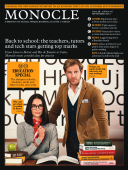
Issue 46
Back to school: the teachers, tutors and tech stars getting top marks. From Lima to Beirut and Rio de Janeiro to Cairo, Monocle meets a model class for 2011/12.
In This Issue
Oops! No content was found.
Looks like we no longer have content for the page you're on. Perhaps try a search?
Return Home

